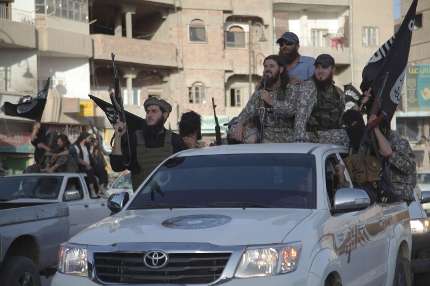Human rights violations and armed groups—a legally grey area

With increasing frequency the United Nations accuses armed rebel groups in conflict areas of violating human rights but there is a considerable lack of clarity about the legal basis on which this is done. Holding parties to an armed conflict to account on the basis of international humanitarian law is uncontroversial but the holding them to account under human rights law raises a myriad of questions. A person must be called to account on legal grounds and in the case of armed groups these are often unclear. To create more clarity lawyer Katharine Fortin calls for the legal grounds to be linked to the territory that the armed rebels control and their level of organisation. She did PhD research into 'armed groups and international human rights' with funding from the Open Competition of NWO Social Sciences. She defended her thesis on 23 October at Utrecht University.
There is scarcely any discussion about the enforcement of international humanitarian law as set out in the Geneva Conventions. These Conventions contain rules that must safeguard the protection of prisoners of war and civilians during periods of conflict. The law of war also applies during civil wars. Upholding human rights is a considerable challenge for monitoring bodies such as the United Nations and European Union. In times of conflict between or against armed groups, it is even more difficult still.
Human rights that can be jeopardised include the right to freedom of speech, the right to health, the right to family life and the right to self-determination. Civil wars with several fighting factions are now far more prevalent than the number of armed conflicts between States. As a result, the importance to achieve clarity on the warring parties' obligations under human rights law is increasing. But how do you address such a group about human rights violations and what legal arguments do you employ?
Practice not sufficiently embedded in the framework
'Citizens are not solely victims if rebels control a certain area,' says Katharine Fortin. 'Everyday life continues. Children go to school, people have legal conflicts and common crime takes place. The United Nations increasingly uses terms like "we hold armed groups accountable under human rights law", but "accountability" must be based on legitimacy. This raises the question whether you can hold non-states and armed groups to account under human rights law? Some academics say never and others say always and the rest say somewhere in between. These viewpoints, however, remain opinions without sufficient theoretical support. That must change.'
In practice, the UN monitors to what extent armed groups respect international humanitarian law in armed conflicts such as Syria, Central African Republic and Afghanistan. In official declarations about this the UN very often also accuses the armed group of violating humans rights law too. However, the basis for these statements usually lack sufficient legal support and analysis. Katharine Fortin's research reveals that at the very least it should be established whether such an group is a single legal entity that can be called to account independent of its "members". This is the first aspect that must be investigated.
Armed groups have countless distinguishing details, states Fortin, which have consequences for their accountability. 'For example, the armed group Islamic State would like to set up an actual state, with its own territory, legal system, education and a 'government'... That is completely different from some of the armed groups in the Democratic Republic of Congo who are always on the move and have no plans whatsoever to establish a state. However even nomadic rebel groups move in the company of complete households and families. Can you then hold such an armed group accountable for women's rights and the right to healthcare, for example? And under which conditions can that be done?'
Monitoring conflict areas
Katharine Fortin concluded that before international laws can be applied to an armed group it needs to be established whether the armed group is organised. At the same time the UN needs to form a picture of the activities deployed by the group in the area of governance. If these factors are consistently analysed, Katharine Fortin argues that a detailed jurisprudence will emerge on the basis of which the UN can hold rebel groups accountable for human rights violations.



















